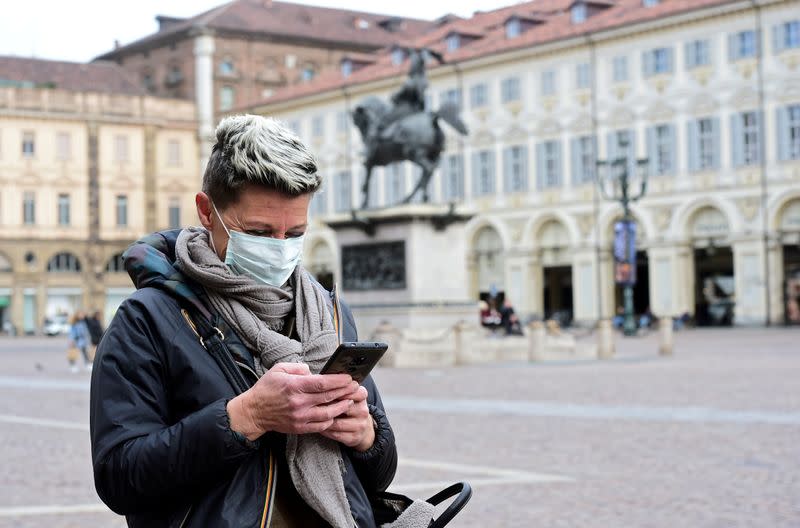European mobile operators share data for coronavirus fight
By Elvira Pollina and Douglas Busvine
MILAN/BERLIN (Reuters) - Mobile carriers are sharing data with the health authorities in Italy, Germany and Austria, helping to fight coronavirus by monitoring whether people are complying with curbs on movement while at the same time respecting Europe's privacy laws.
The data, which are anonymous and aggregated, make it possible to map concentrations and movements of customers in 'hot zones' where COVID-19 has taken hold.
That is less invasive than the approach taken by countries like China, Taiwan and South Korea, which use smartphone location readings to trace the contacts of individuals who have tested positive or to enforce quarantine orders.
In Germany, where schools and restaurants are closing and people have been told to work at home if they can, the data donated by Deutsche Telekom offer insights into whether people are complying, health czar Lothar Wieler said.
"If people remain as mobile as they were until a week ago, it will be difficult to contain the virus," Wieler, president of the Robert Koch Institute, said on Wednesday.
Germany is entering the epidemic's exponential phase, Wieler added, warning that without progress in reducing person-to-person contacts, as many as 10 million people could be infected in two or three months.
However, privacy advocates are sceptical about whether sharing customer data is useful or proportionate, even in a time of crisis. One said that, if people know their phones are being tracked, they will just leave them at home.
"I strongly doubt the value of sharing such customer information," said opposition Greens lawmaker Tabea Roessner.
ITALY, AUSTRIA
In Italy, mobile carriers Telecom Italia, Vodafone and WindTre have offered authorities aggregated data to monitor people's movements.
The Lombardy region is using the data to see how many people are observing a strict lockdown. Movements exceeding 300-500 metres (yards) are down by around 60% since Feb. 21, when the first case was discovered in the Codogno area, the data show.
"Wherever technically possible, and legally permissible, Vodafone will be willing to assist governments in developing insights based on large, anonymised datasets," CEO Nick Read said.
Austria imposed a regional lockdown after coronavirus spread among ski tourists in Tyrol who, as they headed home, have spread the infection across central and northern Europe.
A1 Telekom Austria Group, the country's largest mobile phone company, is sharing results from a motion analysis application developed by Invenium, a spin-off from the Graz University of Technology that it has backed.
The tool is compliant with EU privacy rulebook the General Data Protection Regulation, which restricts the processing of sensitive personal data without its owner's explicit consent.
Invenium analyses how flows of people affect traffic congestion or how busy a tourist site will get, said co-founder Michael Cik, but its technology is equally applicable to assessing the effectiveness of measures to reduce social contact or movement that seek to contain an epidemic.
Austrian campaigner Max Schrems, who has fought a series of legal battles over Facebook's privacy practices, had his doubts.
"As long as the data is properly anonymized this is clearly legal," he told Reuters.
"But to be honest, in Austria you just have to look out of the window to see that people stay home."
(This story corrects paragraph 12 to show Austria imposed a regional lockdown; fixes company name in paragraph 13.)
(Writing by Douglas Busvine; Additional reporting by Nadine Schimroszik and Paul Sandle; Editing by Gareth Jones and David Goodman)

 Yahoo Finance
Yahoo Finance 

